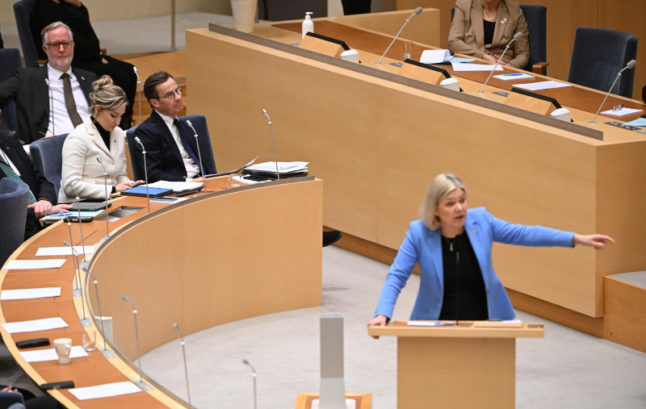Magdalena Andersson of the Social Democrats is seen positively by 55 percent of Swedes, the latest survey by pollsters Ipsos and daily newspaper DN suggests.
Meanwhile the current prime minister, Ulf Kristersson of the centre-right Moderates, is polling at just 32 percent.
And if we look at negative views, Swedish hearts seem to have hardened against all three party leaders of the governing coalition.
Hit especially hard is Liberal leader Johan Pehrson who is now seen unfavourably by a whopping 70 percent, compared with 47 percent in the Ipsos April 2022 poll.
After the election, he became minister for employment and integration in Kristersson’s government, which is supported by the Sweden Democrat party – a party that has long been seen by Swedish liberals as extremist.
“This is yet another sign that the government is having a tough time,” said Ipsos analyst Nicklas Källebring.
But it’s not just in this one poll that things are looking tough for the centre-right government.
In the February political poll for Novus, another polling company, Magdalena Andersson’s Social Democrats recorded their highest result since 2009, and in the Novus party leader poll from January she’s also riding high, seen favourably by 54 percent, while other leaders’ popularity is falling.
The CEO of Novus remarked about the other leaders that “I can’t remember seeing this kind of collapse ever before. Not just for the leaders of the pro-government parties. Or for the opposition parties. But fairly broad.”
Sweden is hence facing a situation where the only politician who is broadly popular is someone who is not in power.
But this doesn’t mean that Sweden needs to expect a change of government or even a change of party leaders soon.
The pro-government parties may be in a minority according to the opinion polls, but in Sweden’s parliament, the Riksdag, they have a majority of 176 to 173. This would only change if one of the pro-government parties felt unhappy enough to leave the coalition.
And if you look at how happy the parties are with their own leaders it’s a different story.
Ulf Kristersson may only have a rating of around 30 percent in the country as a whole, but among his own party’s voters it’s on 83 percent.
Likewise Liberal leader Johan Pehrson may have a generally negative rating in the Novus January survey, but among voters for his allied parties it’s only 23 percent.
The Liberal party itself is unfortunately polling so low that it’s hard to get a big enough sub-sample of its supporters to know what they think of Pehrson in a general poll.
As long as each of the leaders of Sweden’s governing parties can manage to hold the line against internal calls to leave the coalition, they can continue to govern. Even if they may not have overall opinion figures as rosy as those for their rival Magdalena Andersson.
The head of Novus, Torbjörn Sjöström, has also pointed out another development that has become clear from the last few weeks’ polling.
“There is a high level of political conflict and a strong polarisation,” he said to public broadcaster SVT at the end of January.
The proportion of Swedes who are not really taking sides seems to have shrunk. At this point the surveys suggest that the country is more definitely split between those who are warmly supportive and those who are disaffected and unsupportive of the government, with fewer remaining in the middle ground.




 Please whitelist us to continue reading.
Please whitelist us to continue reading.
Member comments